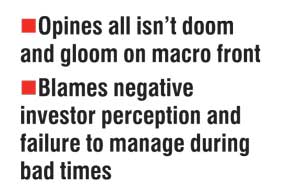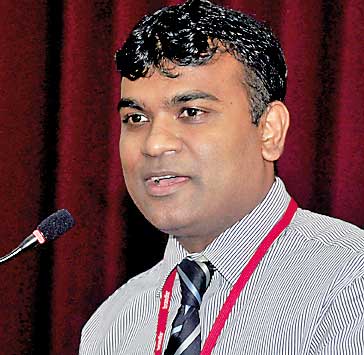Wednesday Feb 25, 2026
Wednesday Feb 25, 2026
Tuesday, 23 February 2016 00:00 - - {{hitsCtrl.values.hits}}
 By Shehana Dain
By Shehana Dain
Bringing a balanced view to the mixed fortunes of the Colombo Stock Exchange, an expert recently stressed the current situation is not as grim as commonly perceived, recalling the country has weathered worse situations in the recent past.
Brandix CFO Hasitha Premaratne in a recent seminar bringing positivism to the gathering stressed that Sri Lanka’s economic woes in the global front were far lower compared to other countries going through severe financial turmoil.
“We are very good at getting into a mindset and saying ‘this is bad’ and keep on talking about it. When the mood is good we say companies with zero assets are good but when the mood is bad companies with fundamentally sound stocks are also bad,” Premaratne said at a presentation titled ‘Macro Shocks Vs Colombo Bourse’ organised by the SEC’s Capital Market Education and Training Division.
The year 2015 was known as the year of volatility in the market as ups and downs were frequent but the overall trend ended up on a negative note. Therefore the ASPI index which started at a peak of 7,600 points ultimately closed the year at 6,800 points,an 8% drop. Meanwhile, 2016 bought forward the negative impact and is yet to bounce back.
Elaborating on the role the capital market community should undertake to bounce back, he said: “The world is in hot water and we seem to be in a better place.
We all know the market will correct itself; today people have forgotten that they earned big sums during the peak period of the stock 
market and now they only talk about the negatives.”
He also said that even during height of the civil war the market performed well, not going below 3% compared to the current dip of 8%.“The market is performing worse than it was during a time when bombs were blowing up every now and then. It’s because we have got used to a better time and we have forgotten how to handle bad times.”
Addressing possible action plans, Premaratne pointed out: “You must talk to the investors who have never known worse times than thisin this language. Have a diversified portfolio without limiting your exposure to onestock from a small investor point of view. In the meantime be aware of the macro developments and shift the portfolio. This could be questionable in a short-term aspect but in a long-term scenario it’s going to bring more money to the investors.”
According to him, the Chinese economy which has been driving global growth for the past 15 years has shown signs of slowdown, which has impacted global growth. China’s decision to devalue its currencyhad a global impact,especially in this part of the world, particularly on Indian, Malaysian and Taiwanese currencies.
“When we talk of our exchange rate, what we forget is that the Indian Rupee exchange rate which was INR 58 last year is INR 68 today. That’s depreciation of 19%. We speak about our 10% being very bad and our Government not doing its job well but don’t forget our neighbour which has billions of foreign reserves has lost almost 19% of its current value,” he highlighted.
Moreover, the Russian Ruble has depreciated by about 50% due to its political unrest and sanctions imposed subsequently.
Additionally he highlighted that Sri Lanka was a silent beneficiary during the economic calamity the world was currentlyexperiencing.
“The oil price and commodity price crash has majorly impacted the world. Indian steel companies are closing down on a daily basis as their losses per day mount up to $ 8 billion. Even though we say we should produce commodities, at this juncture we are blessed that we are not inthe commodity game. Low oil prices are good for us while it’s not disastrous for the Middle East; it’s a huge comfort factor to bridge our budget deficit. Thus we are the place to be and the place to invest, yet we complain about our situation.”
Addressing macro factors and their impact on the Bourse, Brandix CFO Hasitha Premaratne stated that the hung Parliament and unstable Government had been the most impactful red tape which had slowed down CSE growth.
“The Unity Government looks stable on paper but with these diverse views, can we really finalise the decisions that we want to make? One can always argue that it’s democracy, but growth will require a balance between democracy and dictatorship. So we need to find middle ground, otherwise this delay in decision-making is going to affect the stock market from an investor perspective.”
Commenting on Budget 2016, Brandix’s CFO said that it was “disastrous,” adding that continuous change in budget proposals tended to dampen investor sentiment.
“We had one of the most disastrous budgets in the history of this country last November. They were trying to do too much in one budget. Change management isn’t easy because it involves people and changing people isn’t an easy job. These guys thought that reading something in the Parliament would change the game. It looked a very reformist budget which was good in a longer-term economic kind of view but too many policy shifts were proposed and ultimately ended up with the reversing of more than half of them. It gave a serious setback to consistency and stability because even after the Budget was passed there have been many shifts, which has created a lot of uncertainty in investor mindsets,” he opined.
Nonetheless on a confident note he said that the Government would definitely strengthen the tax net via the new Budget, adding that it was the correct thing to do.
“The Inland Revenue Department is going through a revamp. The industry and service sector will get prominence while State institutions are said to go through capital market activity. These policies look realistic, but can they be consistent?” he queried.
He also said that the current UNP Government during its earlier short term as the ruling party had similar good policies but lacked implementation, however he noted that now things could shift to a more positive footing.